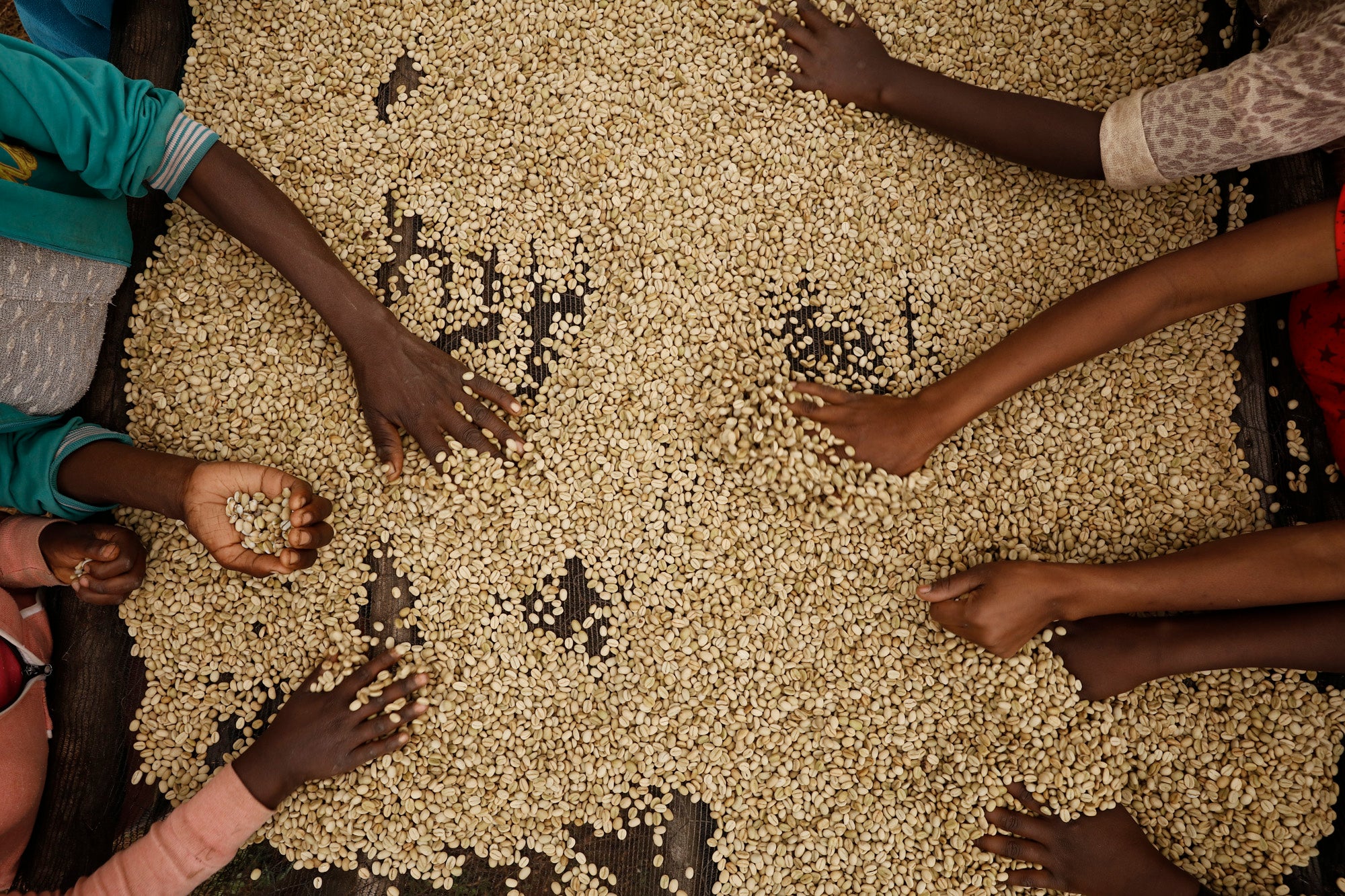Bolivia 2016
This week we have released three coffees from Bolivia. This is a big milestone for Drop Coffee, to be able to manage and work directly with one producer and exporter in a long term relationship, where we can make a big impact. However the two superheroes for Bolivian specialty coffee is our exporter and producers Pedro and Daniela Rodriguez. 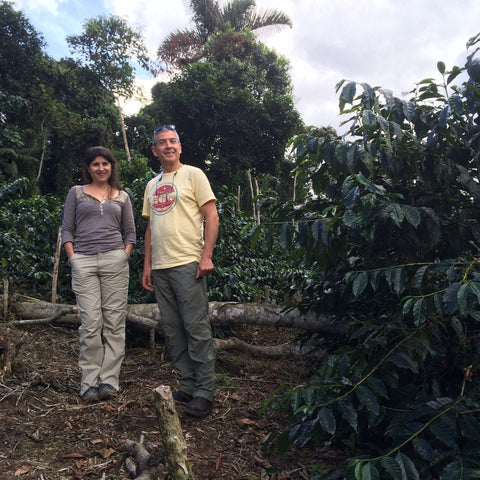
Daniela and Pedro Rodriguez
Our goal is just to get a tastier cup of coffee, but if we can do this and make a positive impact its a win-win situation. For five years I’ve been trying to get my hands on coffee from Bolivia, simply because I truly loved the taste profile; mature dried fruit, vibrant yet very sweet coffee. However, the volumes have always been too small and the problem is getting worse with decreasing volumes. Being land-locked also means that it’s a tricky origin to export from.
Together with my new business partner Stephen Leighton we have the opportunity to work with the Rodriguez family, who are pioneers and true heroes of specialty coffee in Bolivia.
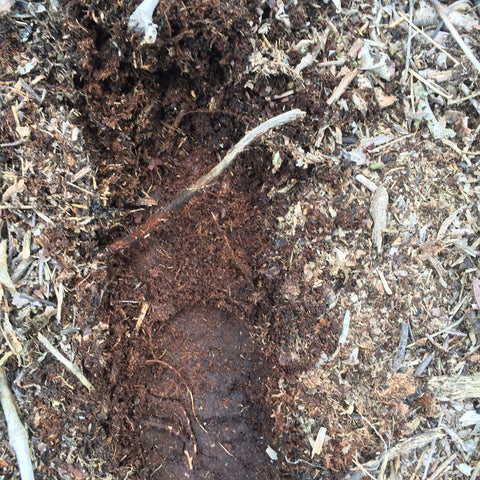
The rich soil in Caranavi
Bolivia is unique and an amazing origin, and not only do I love the taste profile, I fell in love with the country. So diverse and many small producers fighting against obstacles to grow coffee. Further the altitudes are giving alot of opportunities and the soil is super rich . I got a great insight into these challenges whilst visiting lots of producers in the Caranarvi region and the biggest challenges as listed below:
- Leaf rust rampant, becoming a bigger issue year on year, for the past five years - Coca production, encouraged by the government and legal in Bolivia. Far more profitable (up to four times) and far less work than coffee. Used for tea and chewing in Bolivia but often illegally turned in to cocaine for the rest of the world.
- Urbanisation. The new generation of farmers see a better future in an office or call centre than being a farmer
- Climate changes, making it challenging for the farmers to anticipate the weather giving challenges for coffee growing and processing, and adding more unpredictability to the farmers life.
The Rodriguez family, started a project with their farmers; working for a more profitable and sustainable production.They aim to raise quality while teaching local farmers how to better look after thier coffee plant through ideas such as fertilisation and combating leaf rust. Further, they are also improving the processing of the coffee, working with both mechanical dryer and crying beds. They are processing the coffee on their facility for all the connected surrounding farmers in the project.
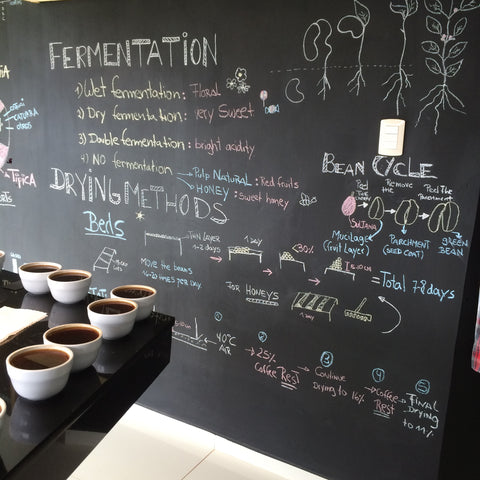
Daniela sketching up the improved processing method in their cupping lab
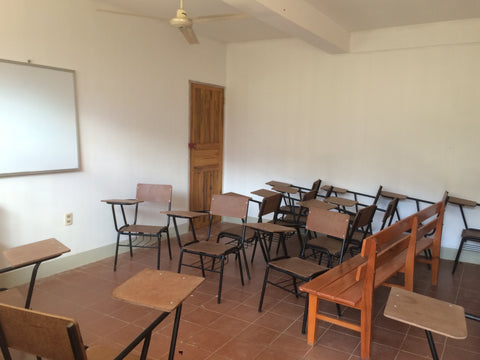
The lecture room of Sol de Mañana
At Drop we want to have a longterm, sustainable and environmentally responsible approach to everything we do. With our Bolivian coffees we feel we have done all of this whilst adding some delicious and unique coffees to our portfolio.
We’re now having three coffees in from the Rodrigues Sol de Mañana project: Collasuyo, La Linda and Villa Tunari.
Totally different taste profiles and volumes, more info below.
/Joanna Alm
RODRIGUEZ, LA LINDA, BOLIVIA

Overlooking the plants at La Linda
This coffee is from Daniela and Pedros Rodriguez own farm which they have invested in to show the other growers what can be achieved in quality and in turn get a higher price for a higher quality. Growing a coffee like Longberry truly showcases how complex and lively a Bolivian coffee can be.
Caranavi, which is located 150 kilometer north of La Paz city is the center of Bolivian coffee production. The combination of rich soil and encouraging altitude has given the potential to produce uniquely exotically produced coffees. Despite it’s international recognition, Caranavi has been negligent and careless in it´s coffee production, geared instead toward aging coffee plantations and high pressure on the coca cultivation, being 4 times more profitable.
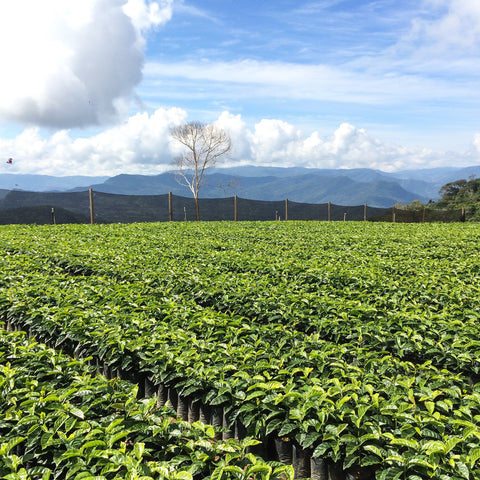
The nurcery at La Linda
To try to save specialty coffee in Caranavi, our exporters Daniella and Pedro Roudriguez have started the project Sol de Manana. They have been sourcing coffee from small coffee producers in the region for three decades, however the steady decline of coffee production has put strain upon the sustainability of the business, which is now at risk of falling onto a degenerative trajectory. They have assumed the challenge of boosting the production to support the growth of Bolivian coffee and undertaken the development of new coffee plantations under a sustainable model based in three pillars: Economical, Social and Environmental; Sol de Manana. In this project La Linda was the very first and perhaps most important farm. Besides Caturra and Typica, here they are growing new exotic varieties to plant in its farms and implement new processes post-harvest. One unique example being the Longberry varietal. This one amazes us with its elegant white sugary-like sweetness and floral notes. This coffee is one of the four coffees we’re buying from Daniella and Pedro this year, with the full harvest coming in at only 140 kilos.
FACTS
Producer: Daniela and Pedro Rodriguez
Location: Collasuyo, Caranavi, Bolivia
Varietal: Longberry
Picking Date: July 2015
Elevation: 1650 masl
Processing: Full-washed
Flavour description: Notes of mature apricot in aroma. Elegant with light-medium body. Reminisces of white floral and plums.
RODRIGUEZ, VILLA TUNARI, BOLIVIA
Villa Tunari is a new colony that have just started working in the project Sol de Mañana. Elda is a young women who together with her husband Felix Choquehuanca source beautiful cherries from the colony of Taypiplaya. Every night from 12 pm to 4 am Elda and her husband brings the cherries to the mill Buena Vista where the coffee is processed. They are now a part of the program that Daniela and Pedro has, called Sol de Manana. Pedro and Daniela are exporting the coffee and finding a good market for it, they are also training the farmers to work for a higher quality with less leaf-rust.
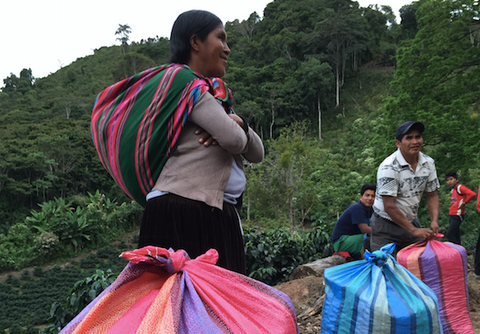
Elda and Felix Choquehuanca delivering cherries
FACTS
Producer: Elda and Felix Choquehuanca
Location: Taypiplaya, Caranavi, Bolivia
Varietal: Caturra, Catuaí and Typica
Harvest: May to September 2015, peaking in June and July
Process Date: 19th July 2015
Elevation: 1550-1650 masl
Processing: Full-washed
Flavour description: A mature and sweet cup with a medium body. Notes of red grape, raisin and dried fruit.
COLLASUYO, BOLIVIA
In the small colony of Collasuyo in Caranavi region Nicolas Calque and his wife Maruja are doing a careful job at their process station. They have a farm called “ La Florida” in Collasuyo of 12 hectares where they produce and process their coffee. Nicolas started in coffee industry 18 years ago. His neighbors recognize him as a coffee lover and at the age of 14 Nicolas went to live with grandmother as his family were having economical problems. He started working as coffee picker, whilst his grandmother provided food and shelter. In 1999 Nicolas invested all his savings and bought a farm in the colony of Collasuyo where he dedicated his entire farm to produce coffee, but the prices they were receiving for their product were too low to cover the family costs. In 2010 Nicolas and his wife sold their farm and moved to Brazil to improve their quality of life. However, they soon changed their mind, ”It was not what I expected, I worked over 8 hour in a sewing plant, we lived with 20 families locked in a room in poor conditions.” says Nicolas. Six months later Nicolas returned home to Collasuyo with his family and bought back the coffee farm in the farm from his savings. This has motivated Nicolas to produce more and tastier coffee. He’s a part of the program that Daniela and Pedro has, called Sol de Manana. Pedro and Daniela are exporting the coffee and finding a good market for it, they are also training the farmers to work for a higher quality with less leaf rust. This year Nicolas has planted two more hectares of coffee.
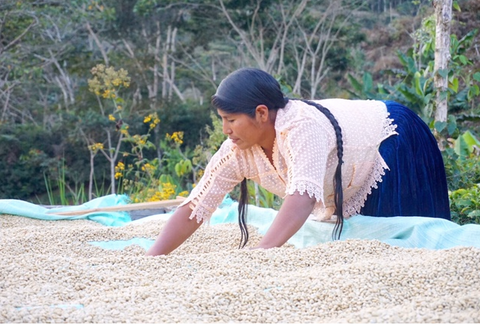
Maruja Colque
FACTS
Producer: Nicolas and Maruja Colque
Location: Collasuyo, Caranavi, Bolivia
Varietal: Caturra, Catuaí and Typica
Harvest: May to September 2015, peaking in June and July
Process Date: 19th July 2015
Elevation: 1550-1650 masl
Processing: Full-washed and dried on chemical beds for 7-9 days.
Flavour description: A very mature and sweet cup with a big body. Notes of red grape, rasin and dried fruit.
Flavour description: Mature and sweet cup with notes of milk chocolate and ripe cherries. Medium and creamy body.
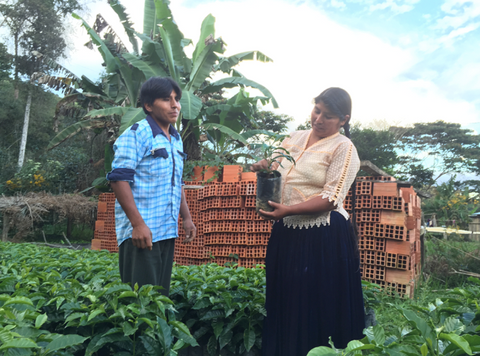
Nicolas and Maruja Colque
Learn More
- Choosing a selection results in a full page refresh.
- Press the space key then arrow keys to make a selection.
